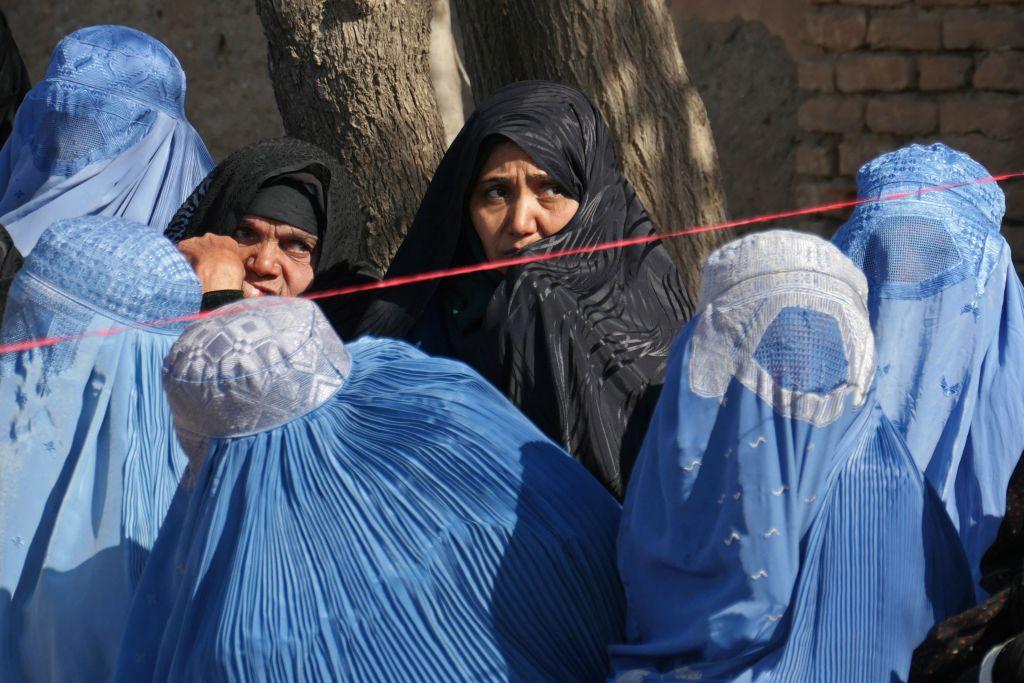
Sunday 10 December was International Human Rights Day, marking an area in which Australia has a strong historical record of advocacy. It was pivotal in negotiating the Universal Declaration of Human Rights 75 years ago. Sunday was also the last of 16 days of global activism to end gender-based violence.
But in Afghanistan, the Taliban are cracking down on women’s human rights defenders more than ever, and Australia is no longer giving these brave people priority processing to help them escape.
This is not okay.
Parisa Azada was arrested on 15 November. She’s a 24-year-old Hazara woman from Bamiyan who graduated from Kabul University. She’s a founding member of the Afghanistan Women’s Movement for Justice and Freedom. There has been no international press coverage of her case. Her family don’t know where she is and haven’t had any communication with her.
Her fellow activists are terrified Azada will provide details about them to the Taliban under torture. Women’s rights groups in Afghanistan operate in a cellular fashion, so if someone is caught, they won’t all be revealed to the Taliban. But many women still want to defy the regime that runs the country openly.
The female journalist who reported on Azada’s case and ongoing women’s rights activism is in hiding, terrified for her life. The two were close friends, and she remembers Azada telling her to tell her story to the world if she went missing. Now, her friend tearfully tells Azada’s story, and fears that she will be next.
The day Azada was arrested, a protest was scheduled that was to be photographed and shared with the media. She never showed up, and the protest didn’t happen. With her arrest, the group dispersed, hiding and on the run to avoid sharing Azada’s fate.
Hosna Sadat, a journalist who covered gender issues in Afghanistan, was killed during a desperate escape attempt on the night of 31 November. The Taliban reportedly blocked the only entrance to her building, and Sadat jumped from a window with her two children. It’s understood that she didn’t survive the fall but her children did.
In recent months, at least five women’s rights activists have been arrested by the Taliban.
Nabila Rahimi was arrested on 22 November. In addition to being an athlete and human rights activist, she was a counsellor and health educator at a non-government organisation that contracts with the UN Development Programme. She was assaulted and taken from her workplace in Chahar Taille Market in Taleqan to a Taliban prison.
Neda Parwani, a prominent member of the Strong Women Movement (Jonbish-e-Zanan), was detained on 19 September with her husband and their four-year-old child at their home in Kabul. Following weeks of reported mistreatment, Parwani and her spouse are still in custody and their child is now living with family members.
Zhoulia Parsi, a Tajik woman and former Dari language and literature teacher, was arrested on 27 September. She became a women’s rights advocate after she was prevented from continuing her teaching career. Parsi and her 17-year-old son were taken into custody at their home and are both now incarcerated.
Manizha Sediqi, another prominent Tajik women’s rights activist and protester, was taken from Karte Naw in Kabul on 9 October. Laila Tabasom, a leader of the Spontaneous Movement of Afghan Women Protestors, reported the arrest to the local media on 23 October. Tabasom disclosed that Sediqi’s family had been attempting to keep her arrest a secret for 15 days as they sought assistance from ethnic and religious leaders. Their efforts proved futile.
These arrests underscore women’s challenges in advocating for their rights in Afghanistan.
None of the female protestors has faced criminal charges. The authorities have transported them to an undisclosed location, raising concerns about their wellbeing and the lack of transparency.
Australia has designated 26,500 visa places for Afghans under the offshore humanitarian program until 2026. Priority is given to those with ties to Australia, split families and individuals outside Afghanistan, including certified former locally engaged employees, immediate family members of refugee and humanitarian visa holders, refugees referred by the UN Office of the High Commissioner for Refugees, and specific minority groups.
Australia rejects claims from applicants inside Afghanistan, on the basis that it does not have staff inside Afghanistan to verify identities or make character assessments. However, Australia could allow applicants to travel to a suitable processing centre outside Afghanistan before reaching a decision. If an applicant was told their application was up for consideration, they could apply for a standard visa for Pakistan or Iran and undergo normal visa processing with Australia in either of those countries. Instead, Afghans who manage to escape are waiting indefinitely in neighbouring countries like Iran and Pakistan with the threat of being deported when their visas expire. They may still have their Australian visa applications rejected outright.
Organisations like Azadi-e Zan have spent years advocating on behalf of Afghan women’s rights defenders. Of the hundreds of individuals on the list for the support provided by Azadi-e Zan, most met several of the earlier criteria for priority processing by Australia—such as having been human rights defenders, being from a minority ethnic group, being women and having family or other close ties with Australia.
If the system worked correctly, women’s rights defenders on lists like those provided by Azadi-e Zan, who meet several criteria, should be processed first. But, at present, individuals meeting just one criterion whose applications happen to be at the top of a pile being considered for sanctuary in Australia are processed regardless of the true risk they face.
The Taliban continue to strengthen their gender apartheid regime. Australia must acknowledge and respond to that. We should support efforts to have gender apartheid included as a crime against humanity. We must increase our funding for women’s rights defenders in the Asia–Pacific. We must reprioritise human rights defenders in Afghanistan, processing their visas in a timely fashion so they can get to safety away from the Taliban when their lives depend on it.